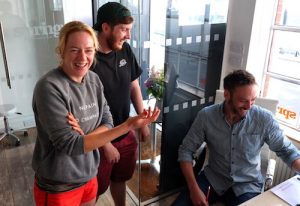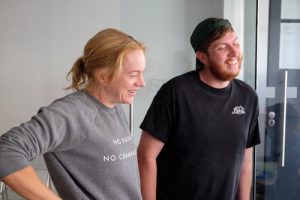
DBA Roundup
A roundup of industry expertise, exclusive resources, business support and tools for your design business.
 Think about it. You are truly a very different consumer than other members of your family and your closest friends. Your demographics, psychographics and even your Amazon purchase history don’t define your relationships with brands such as Pepsi. You are unique and your relationship with Pepsi, for example, needs to reflect that. Adding to that, your every consumption experience with Pepsi can also be very different. Sometimes you bring it to a laid-back barbecue in a friend’s garden, and other times you serve it at an elegant cocktail party. Shouldn’t the brand experience reflect that hyper specialised, truly unique engagement? And if it did, wouldn’t your relationship with Pepsi be stronger and deeper? Could this be the “tipping point” between your choosing Pepsi over Coke every time?
Think about it. You are truly a very different consumer than other members of your family and your closest friends. Your demographics, psychographics and even your Amazon purchase history don’t define your relationships with brands such as Pepsi. You are unique and your relationship with Pepsi, for example, needs to reflect that. Adding to that, your every consumption experience with Pepsi can also be very different. Sometimes you bring it to a laid-back barbecue in a friend’s garden, and other times you serve it at an elegant cocktail party. Shouldn’t the brand experience reflect that hyper specialised, truly unique engagement? And if it did, wouldn’t your relationship with Pepsi be stronger and deeper? Could this be the “tipping point” between your choosing Pepsi over Coke every time?
Needless to say, the confluence of fast, affordable digital design, digital printing and next day logistics now makes it highly possible to customise every package to every single consumer and their every consumption experience. And that will most certainly change our relationship with all our brands. We no longer will want Pepsi, we will want OUR version of Pepsi for right now.

However, if marketing has taught us anything, it proves that just because something is possible does not mean that all of us will want it, nor be willing to pay more for it. If the Facebook/Cambridge Analytica scandal has taught us anything, its lesson is that some of us do not want to have our personal information used against us to influence our purchase decisions. And now with the EU GDPR regulations in effect, privacy has become paramount for many of us.
And yet, Newton also proved that for every action there is an equal and opposite reaction. For every group that wants to hide their preferences under a security blanket, there are others who want brands to engage with them, and who want to even lead that discussion. These folks know what drives their brand affinity and would like to take an active role in shaping it.
What if the brand used algorithms to inform the design of every individual package, shaping it to every individual purchaser’s preferences? What if when you ordered Pepsi on line, its package first came up on your screen with an identity informed by your preferences? What if you could shape those preferences again to customise it to your current mood or the consumption experience? A little more sporty for that BBQ or a lot more sophisticated for that drinks party. Would that deepen some consumers’ relationships with the brand? Would you be willing to pay a little more for that customised experience? And importantly, would it force brand owners to transfer control of their brand’s identity to the 100 million?
 I believe that a balance can be structured where the consumer can control the brand image and yet never allow it to exceed that which is ‘on-brand’. For example, there will be a most- masculine and a most-feminine execution of the brand image. There will be most-playful and most-sophisticated boundaries. And there will also be assurances that the brand never veers too close to a competitive brand’s identity. No Spenserian scripted Pepsi logos and no red backgrounds for example. This way, the brand message can be customised and yet remain authentic and ‘on-brand’.
I believe that a balance can be structured where the consumer can control the brand image and yet never allow it to exceed that which is ‘on-brand’. For example, there will be a most- masculine and a most-feminine execution of the brand image. There will be most-playful and most-sophisticated boundaries. And there will also be assurances that the brand never veers too close to a competitive brand’s identity. No Spenserian scripted Pepsi logos and no red backgrounds for example. This way, the brand message can be customised and yet remain authentic and ‘on-brand’.
But if we give control of the consumer experience to consumers, what role does the designer play in this exchange? Here is an interesting question. I see the designer having a much broader and as important role in this process as they have ever had. It will be our responsibility to create the primary brand image and then set the boundaries of its evolution. We will create the images that define ‘the most masculine’, ‘the most feminine’, ‘the most playful’ and ‘the most sophisticated’ and all other extreme, but still acceptable, executions of the brand. It will be our responsibility to create the ‘sliders’ as consumers scroll between these parameters. It will be our responsibility to create the templates upon which consumers can play. In short, we will not create the one identity but the canvas upon which the 100 million hyper customised and yet ‘on-brand’ identities will be created.
And that will be a much larger design initiative than just creating the single brand identity. It will require insight and foresight to determine what will motivate every consumer profile. It will require discipline to determine how far the brand parameters can be pushed without going off brand’. And it also may well require ongoing ‘curation’ of the resulting imagery – analysing the result of combining a number of ‘acceptable’ elements that just don’t work together, plucking these ‘off brand’ anomalies out of the mix. To me I believe this to be a much more involved and on-going process. It will require a design eye on the brand at every moment of its evolution, and that could well be more engaging and fun for some of us.
Help determine how it might best work and what traps we, as an industry, need to seal tight before we even begin the journey. It’s a brave new world in need of brave design leadership; leaders who are comfortable with relinquishing some control of the design process to those we are designing for. It will require next-gen design leaders who can walk that balance of ‘re-ordering chaos’ and keeping all of its results ‘on brand’. And ultimately it will require designers who seek to make the consuming community a bit more ‘design literate’ and encourage them to express their own unique relationship with the brand under the watchful eye of the design leader. That’s a future I look forward to.
Image credit:
Photo by Joshua Sortino | Unsplash
Daniil Kuzelev | Unsplash
Nick Fewings | Unsplash
Thought Catalog | Unsplash










 Connecting with your wider community can take many forms. When DBA member Mr B & Friends moved their office from Bath to Bristol they decided they needed to contribute more to the local economy. They developed a roster of local supplier businesses they rarely deviate from.
Connecting with your wider community can take many forms. When DBA member Mr B & Friends moved their office from Bath to Bristol they decided they needed to contribute more to the local economy. They developed a roster of local supplier businesses they rarely deviate from.
Simon Barbato, CEO of Mr B & Friends explains “We felt there was a need to put some corporate social responsibility into our thinking and demonstrate that we want to be a meaningful organisation within the business landscape in Bristol. We have an operating budget of £2.5m a year and so support the circular economy in Bristol by spending it locally.”
 For agencies like Spring, based on the Suffolk coast, community work is at the heart of their ethos as they cement their reputation as one of the most active businesses in the community. “Springers”, as staff are known, are encouraged to volunteer for local projects and get half days off so they can participate in on-the-ground support for voluntary organisations undertaking everything from painting to gardening.
For agencies like Spring, based on the Suffolk coast, community work is at the heart of their ethos as they cement their reputation as one of the most active businesses in the community. “Springers”, as staff are known, are encouraged to volunteer for local projects and get half days off so they can participate in on-the-ground support for voluntary organisations undertaking everything from painting to gardening.
The agency sees itself as an organisation that can help facilitate action – by getting stuff done.
Read more about the importance Spring places on community in their own words here.
 On Teesside, Better is a brand agency that believes they have a responsibility to the next generation. Better is deeply committed to supporting the High Tide Foundation and invests heavily, both as a business and as individuals, in its growth. MD Mark Easby has been a trustee of the Foundation for over four years and helps drive the strategic growth, programme delivery and scale. This includes sector driven Work Experience programmes built around a number of sectors including Creative, Digital and Media, as well as the development of a pilot for a Creative and Digital Cadetship. The programmes delivered through High Tide not only provide real life work experience, they also offer genuinely unique and life-changing opportunities for young people.
On Teesside, Better is a brand agency that believes they have a responsibility to the next generation. Better is deeply committed to supporting the High Tide Foundation and invests heavily, both as a business and as individuals, in its growth. MD Mark Easby has been a trustee of the Foundation for over four years and helps drive the strategic growth, programme delivery and scale. This includes sector driven Work Experience programmes built around a number of sectors including Creative, Digital and Media, as well as the development of a pilot for a Creative and Digital Cadetship. The programmes delivered through High Tide not only provide real life work experience, they also offer genuinely unique and life-changing opportunities for young people. 
Mark Easby, MD, Better says “It’s fantastic to see the impact these programmes are having with our graduates now going on to begin apprenticeships and further study, many within STEM, creative and digital areas. That’s the real magic of High Tide, seeing the Teesside spirit grow and come to life through the achievements of our young people. At Better we build world class brands right here on Teesside with a team of people born, bred and trained in our region, so using our agency skills to support High Tide’s brand development, marketing and membership growth is very rewarding. We’re very proud to be members of High Tide and I am personally honoured to be a Trustee of a Foundation that’s making so much difference to the area we love and inspiring the next generation of talent.”
 Sometimes some ideas can snowball. Thompson Brand Partners are based in a residential area in Leeds and have always felt a part of the community. For Owner and Creative Director Ian Thompson, this engagement is “simply good citizenship and it stops you feeling separated and in a different world to everyone else around you.” Three years ago Thompson Brand Partners helped to found a community cinema with the express wish of getting elderly local residents, many of whom have lost their partners, out at least once a month. Three years on and they sell out every month with 150 visitors.
Sometimes some ideas can snowball. Thompson Brand Partners are based in a residential area in Leeds and have always felt a part of the community. For Owner and Creative Director Ian Thompson, this engagement is “simply good citizenship and it stops you feeling separated and in a different world to everyone else around you.” Three years ago Thompson Brand Partners helped to found a community cinema with the express wish of getting elderly local residents, many of whom have lost their partners, out at least once a month. Three years on and they sell out every month with 150 visitors.
Ian explains “It’s strictly old school but with new technology. We deliver a proper big screen experience with good sound and a proper screen and projector. But we have an interval, so people can mingle and we’re happy for people to take their drinks into the auditorium. The fact people now expect it, is really the key to its sustainability and we really enjoy being involved.”










Political events over the last couple of years have demonstrated that political strategists had lost insight to the hopes and fears of people outside the patch. Spring launched the HyperlocalEverywhere Network in response to this, supplementing our own regional footprint with a network of community engagement specialists across the UK, generally in the less well-trodden zones of political focus.
When you need to deliver behavioural change – whether you are launching a brand, or pulling a hospital or school out of special measures – you want to focus on the smallest possible community. It ensures your message is clear, your budget is well spent and your chances of success are raised. That’s essentially hyperlocal, and we have our own community insight methodology HyperlocalEverywhereTM which is used for information gathering and ongoing engagement with these communities.
Sometimes people in their professional roles underestimate people in their “target” role, and this is something we are cautious to avoid. To mitigate this, we work on a voluntary basis with communities, ensuring we understand them as living, breathing human groups, not data. This ranges from contribution to regional economic growth programmes to on-the-ground support for voluntary organisations, giving our team four half days off a year to paint, pour tea, chat and garden – in other words, anything that isn’t what they do for a living.
On a strategic level we ensure participation in the conversations about change. We support the West Midlands Women’s Voice, which is a network of senior women working to ensure the West Midlands Combined Authority embeds equality in its strategy. We contribute to New Anglia Local Enterprise Partnership’s thinking on economic opportunity, talent retention and inward investment. We have advised Cabinet Office communications teams on community insight. These and other activities help us to maintain the ‘big picture’ thinking that’s vital to ensure our commissioned community work has appropriate legacy as well as immediate impact, and to allow us to build up a tapestry of projects which combine to support change.
 On the ground, as well as the kind of sleeves-rolled-up volunteering that keeps us in the real world, we also support small businesses that might not be able to afford our services with skills workshops, allowing them to create networks at the same time as learning best practice and future-gazing. We put aside budget to cover a small amount of pro bono work – for example, we are currently working with a boxing club that goes out of its way to support young people who are showing signs of disengagement, since they won’t be able to provide that service if they can’t survive commercially.
On the ground, as well as the kind of sleeves-rolled-up volunteering that keeps us in the real world, we also support small businesses that might not be able to afford our services with skills workshops, allowing them to create networks at the same time as learning best practice and future-gazing. We put aside budget to cover a small amount of pro bono work – for example, we are currently working with a boxing club that goes out of its way to support young people who are showing signs of disengagement, since they won’t be able to provide that service if they can’t survive commercially.
On which note, one piece of advice I would give to any agency that wants to start to deliver its own community outreach is – set a budget. Doesn’t matter whether you set this in pounds or percentages, but be clear. It’s much easier to say “No” if you can relate it to a budget, and also to ensure you select the best projects for your skills and experience. As an industry we know our tendency to see the work as the reward, but your own sustainability is essential if you are to carry on supporting your community.
 The world of work is changing. Rising costs of living increasingly mean we’ll all be working for longer. Our always-on culture means that the working day never quite ends. Equality in the workplace will, eventually, seep into equality of caring responsibilities out of work. This means that, inevitably, the lines between work and home will become increasingly blurred.
The world of work is changing. Rising costs of living increasingly mean we’ll all be working for longer. Our always-on culture means that the working day never quite ends. Equality in the workplace will, eventually, seep into equality of caring responsibilities out of work. This means that, inevitably, the lines between work and home will become increasingly blurred.
The positive outcome of that is many more of us will decide that, in that case, work can happen in places which afford a better quality of daily life. Community is where character can be found, where the generations come together, where daily life has its own rewards; and so increasingly we will find ourselves part of that. Contribution is essential for belonging – enjoy it!











The Saturday Club Trust was founded by John and Frances Sorrell in 2009, inspired by the Saturday morning art classes they attended at their local art schools in the 1960s. Building on the simple idea that every young person should have the opportunity to study subjects they love, for free, the Club has grown from strength to strength. About to celebrate its 10th year, the network has blossomed to include 71 Clubs in 56 locations reaching 1500 young people every year.
Attending a Saturday Club is a brilliant process of discovery and learning outside of the school curriculum. Throughout the year, club members often encounter many personal firsts such as their first time in a university or college, their first time in a capital city, their first time in a gallery or museum, and the first time their work has been shown in a public exhibition.
“We are always impressed by the quality of work produced by Club members in our Masterclasses, by the levels of participation and appetite to try new things. They are a credit to the Saturday Club.” Natasha Freedman, English National Opera.

Among these notable achievements is their first encounter with industry experts as part of the Masterclass Programme. Every year, the country’s leading scientists, engineers, architects, designers, artists and many more give up their time to deliver exciting hands-on workshops that provide valuable insight to young people about their industry.
“Our Masterclasses this year was an especially useful experience in helping members understand how the design process works, and that thinking, writing and talking are important parts of that process” Kate Dunstone, Tutor, Manchester School of Art.
Masterclasses are vital in exposing Club members to the sheer number of career opportunities available to them within the design industry. They give young people the chance to meet new role models, ask questions and gain first-hand advice on how to succeed.
The opportunities provided by the National Saturday Club are more vital than ever. Every year independent evaluation shows that the experiences involved allow young people to grow in confidence, make lasting friendships, discover new disciplines, and explore new futures. The Saturday Club Trust is working hard to make sure more and more young people have the opportunity to attend a Club and expand the network as widely as possible across the UK.
If you would like to get involved and support this aim, you can find out more through the National Saturday Club website.










![]()
In many cases there are few or no sustainability considerations in a client’s design brief let alone requests to apply circular economy principles to your designs. But given the current focus on packaging’s impact on the environment, especially plastics, this is the moment in time to be making this an integral part of the brief. Seize the opportunity to get informed and make sustainability part of the new business discussion from the outset – put your stake in the ground and really make it matter, for you, your clients and the world at large.
An ever-growing number of national and global brands are making bold commitments about what they are going to achieve but are they trickling down into your briefs? You can inform yourself by doing the research on your clients’ commitments but also ask them to share their sustainable packaging strategies, ensure you understand them fully and work with them to achieve those targets.

The public wave of anti-plastic sentiment continues to swell to the point where the industry is holding its breath, waiting for the tsunami to hit. And all this has not escaped the attention of those at the highest levels of government where the tsunami may come in the form of tax reforms (Producer Responsibility), taxation or bans of single-use plastics, the introduction of deposit return schemes. But we must hold back that wave by joining together and taking positive action.
The design community does not have to stand alone in its efforts to prioritise sustainability – the wider community of players in the packaging supply chain is more energised than ever behind the topic of sustainability and working to achieve circular economy principles. Although the initial design stage can feel so far removed from the re-processors who are dealing with waste outputs, do not underestimate how critical a touchpoint design can be in driving those principles.
Legacy ways of working has meant each part of that community has worked relatively discreetly, handing over to the next player in the supply chain to “do their bit”. We can no longer work in this way if we want to tackle the issues around packaging and especially single use plastics. For the design community that means understanding a product’s “end-of-life” before it’s even been born and proactively visiting manufacturers or materials recycling facilities to understand what really goes on. The wider supply chain can provide a wealth of knowledge and an abundance of resources.
Are you aware of the four targets in WRAP’s UK Plastics Pact? Did you know that brands, retailers & converters are obligated to pay a tax on the packaging they place on the market – known as the PRN system? If your awareness isn’t up to scratch, a good starting point is to get actively involved in the huge conversation that’s going on around you. The DBA’s recent event on how design can impact the sustainability agenda provided some great insights, and there’s much more out there that can help you sharpen your knowledge like the recent workshops at the British Plastics Federation focused on tackling marine litter.
There have been more events than ever in the past 12 months focused on packaging sustainability but how many have you been to? At the recent “Design for Sustainability” event at the BPF only one design agency was represented. Making sustainability a driving force of your agency, and helping clients shape their sustainable packaging strategies and design briefs through your expert insight, could be a real differentiator for your business.

The issues we’re facing are complex and the dynamic nature of the industry means there are daily stories of new technologies and innovations making outlandish claims that their material is the answer to ocean plastics or eliminating litter. Or brands declaring they’re going “plastic-free” but replacing it with bio-based plastic (which, by the way, is still plastic and will still cause harm if a baby seal ingested it). However things aren’t as simple as that.
As part of the UK Plastics Pact, WRAP has published a new fact sheet about plastic packaging: Understanding plastic packaging and the language we use to describe it. And recently Plastics Recyclers Europe outlined clear advice surrounding the difference between something that is ‘recyclable’ (technically, everything is) and something that is actually recycled. Recoup also has their “Recyclability by Design” guide.
Whilst these guides and factsheets are valuable resources, they often require their audience to have a sound understanding of packaging technology. But how many designers are also pack techs? How many can explain the difference between biodegradable vs. compostable (further split into home or industrially compostable) vs. oxo-degradable (a call for a ban on the latter is being championed by the Ellen MacArthur Foundation)? Did you know that a compostable straw or coffee cup will not disappear in a home compost bin? There’s an opportunity for the design community to reach out to the publishers of these guidelines to ask for what they really need to help them apply circular economy thinking to their work.
Now is the time to embed sustainable design thinking throughout your entire business, because these issues will only get more acute in the future. Why not start with a series of structured sessions or workshops from key industry thought-leaders? And then, with that approach embedded, enhance the team with specialist knowledge as required for specific projects. Engage in crucial industry meetings focused on innovation and influencing policy at the highest levels of government. And along the way stay informed of the issues, understand their complexity so we can be joined up and tackle them effectively. Proactively work to build up an invaluable network of contacts within the industry to facilitate an holistic perspective of the total lifecycle of a product and familiarise yourself with some key industry organisations spearheading the conversation around sustainability. They include:
EMF – Ellen MacArthur Foundation
WRAP – The Waste and Resources Action Programme
Incpen – Industry Council for Packaging and the Environment
Recoup – RECycling of Used Plastics
BPF – British Plastics Federation
OPRL – On-Pack Recycling Label
FSA – Foodservice Packaging Association
We know circular economy thinking should be the driver for sustainable design.
And this is the moment in time to integrate this thinking into your work regardless of whether it’s in the client’s brief or not and to engage with the wider packaging community who are more focused than ever in tackling high-profile, emotive issues such as marine litter.
There’s an abundance of tools and resources out there to support you to do all of the above and the opportunity to get involved and ask for the guidance you require as designers at the start of the supply chain.
Don’t forget 80% of a product’s environmental impact can be influenced during the design stage. Design thinking is a powerful tool that can solve some really complex challenges and the design community are more than up to this challenge.
Despite the fact eco design has not been included in the UK Government’s “25 Year Environment Plan”, it has been included as a key pillar of the “EU Plastics Strategy” – an essential part of the “EU Circular Economy Package”.
The three key principles which underpin the concept of the Circular Economy must be at the core of every design brief:
A design approach with these principles in mind will contribute to minimising the impact of packaging waste on our fragile environment. With the global population set to grow from 7.6 to 9.8 billion by 2050, tackling issues such as increased volumes of waste requires a carefully considered, fully informed and completely aligned global response.









